Peter Kreeft Theology Collection (10 vols.)
Digital Verbum Edition
Overview
Philosopher and apologist Peter Kreeft, the “C. S. Lewis of Catholicism,” tackles the tough doctrines of angels, demons, heaven, hell, suffering, prayer, and many more. These volumes bring Kreeft’s years of research, debate, and counseling experience to bear on tough concepts, with a consistently clear and concise voice that is very much his own. Catholics and Protestants alike will find value in Kreeft’s biblically grounded insights. His work stands strong in the twenty-first century’s dynamic intellectual climate, and speaks softly to the believer’s heart.
Now, with the Logos editions of these texts, you can compile and compare Kreeft’s thought on these complicated issues with that of other theologians and philosophers with just a few clicks. See all Scripture references on mouseover, and find everything the Bible says about angels, heaven, or prayer in an instant. Logos streamlines your study of these fascinating topics
Interested in more from Peter Kreeft? Get three collections at a discounted price with the Peter Kreeft Bundle.
Key Features
- Tested analysis of Christianity’s toughest issues
- Valuable insights for Catholics and Protestants alike
- 10 volumes from Catholicism’s C. S. Lewis
Individual Titles

In response to actual questions many people have asked him about angels and demons, well-known author and philosopher Peter Kreeft separates fact from fantasy and myth from reality as he answers 100 common questions about these spiritual beings. Based on a very popular college course he teaches on this subject, this book responds to the incredible amount of interest in angelic beings and attempts to clear up some of the misinformation abounding in the numerous books today on what we know about these mysterious spirits.
Drawing on the Bible, traditional Church teaching and St. Thomas Aquinas, Kreeft gives straight, clear answers to the perennial and philosophical questions asked about angels and demons throughout time. Kreeft answers questions like: “What are angels made of? How do angels communicate with God? How do angels communicate with us? Do demons, or devils, or evil spirits really exist?” in his typical lucid, profound, and sometimes humorous style.
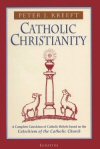
For the first time in 400 years the Catholic Church has authorized an official Catechism of the Catholic Church. Using this official Catechism, Peter Kreeft presents a complete compendium of all the major beliefs of Catholicism in his readable, concise style.
The Catechism of the Catholic Church was written for the express purpose of grounding and fostering catechisms based on it for local needs and ordinary readers, and Kreeft does just that. He offers a thorough summary of Catholic doctrine, morality, and worship in a popular format with less technical language. He presents a systematic, organic synthesis of the essential and fundamental Catholic teachings in light of the Second Vatican Council and the whole of the Church’s Tradition. This book is the most thorough, complete, and popular summary of Catholic beliefs as represented in the universal Catechism.
In Catholic Christianity, Peter Kreeft has taken the core of the Catechism’s teaching and has represented it in his pithy and winning style. The result is the best entree to the Catechism yet—and therefore the best entree to the Catholic faith.
—Karl Keating, author, What Catholics Believe

With the spirit of C. S. Lewis, Kreeft provides an unsurpassed look at the nature of Heaven that offers readers a refreshingly clear, theologically sound, and always fascinating glimpse of the “undiscovered country.” Kreeft’s engaging and informative account thoughtfully answers intriguing questions about heaven, speaking to the mind and heart.
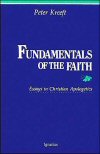
Kreeft considers the fundamentals of Christianity and Catholicism, explaining, defending, and demonstrating their relevance to our life and the world’s yearnings. Here is a book to help you understand your faith more fully and have a ready defense of your hope for others.
Like every religion, Catholicism has three aspects, corresponding to the three innate needs of the soul. Kreeft uses these three needs as the basic outline for his Christian apologetics. First, every religion has some beliefs, whether expressed in creeds or not, something for the intellect to know. Second, every religion has some duty or deed, some practice of program, some moral or ethical code, something for the will to choose. Finally, every religion has some liturgy, worship, or “church,” something for the body, the concrete imagination, and the aesthetic sense to interact with. Creed, Code and Cult, or Words, Works and Worship, is Kreeft’s useful way of outlining any religious faith, including the Catholic faith.
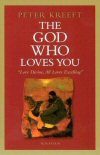
The God Who Loves You
- Publisher: Ignatius
- Publication Date: 2001
- Pages: 226
God’s love is the subject of Peter Kreeft’s imaginative and thoughtful book. With unusual clarity, Kreeft points out that the man or woman who begins to glimpse the God who is creator, redeemer, and lover of our souls, will never be the same. He describes Scripture as God’s love story and then explains why divine love is the answer to our deepest problems and the fulfillment of our deepest desires.
Posing the hard questions about love that rankle the heart, Peter Kreeft never settles for easy answers. He exposes today’s superficial attitudes about love in order lead people into a deeper understanding of what it means to be loved by God.
There is no subject more important to everyone on earth than God’s love. I know of no writer today who can deal with it more justly and lovingly than Peter Kreeft has done.
—Sheldon Vanauken, author, A Severe Mercy

A major book on the subject of heaven, this expanded edition examines the hunger for heaven that is so strong in all of us. Fascinating and upbeat, Heaven, the Heart's Deepest Longing thoroughly explores the psychological and theological dimensions of this search for total joy and for the ultimate reality that grounds it.
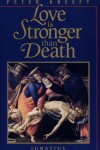
In one of his most penetrating books, Peter Kreeft ponders the meaning of a terminal illness we all have: death. The three vital questions of life, death, and God are approached through a variety of human experiences. Kreeft’s book is a new statement of the Christian vision: the meaning of our existence, and of death, is the fulfillment of our deepest desire for the infinite joy and love of God.
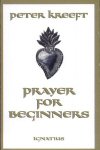
Peter Kreeft brings his unique insights to this vital and oft’ neglected area of our spiritual lives. He claims he himself is still a beginner in prayer, and this book is for all those, like him, who feel that they are not good at praying but desire to become better at it. Kreeft offers simple-yet-profound advice and practical steps for developing a prayer life based on the time-tested wisdom of the saints and great spiritual writers, drawing especially from principles found in the classic from Brother Lawrence: The Practice of the Presence of God.
In short, straight-forward, and unsentimental chapters, Kreeft covers all the key areas necessary for understanding and developing that intimate form of communication with our creator that we call prayer.
There’s no shortage of good doctrinal material today. But, for the post-Boomer generations, the burning question remains: how do I begin to pray? Peter Kreeft answers that question in a simple, direct way that will reach ordinary unchurched Americans—as well as devout Catholics who have hit a dry spell.
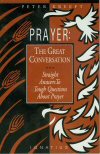
In his typical lucid and original style, Peter Kreeft explores many aspects and questions about prayer, the center of our spiritual lives. In a series of imaginative dialogues, Kreeft shows how prayer can be an exciting adventure, an inexhaustible joy, and a source of wisdom and strength.
Written in a practical, yet inspirational style, this book addresses important areas like finding the time to pray, praying when you don’t feel like it, using the prayer book God wrote, how to overcome sin through contemplation, and how to see God everywhere. Kreeft communicates a vision for prayer that becomes a profound conversation with the God who creates, redeems, and sustains us—the most important conversation in human life.
Written in engaging dialogue form, Prayer: The Great Conversation . . . takes you right along with all your doubts and hesitations into the place of freedom, love, beauty, and fulfillment, even in the midst of suffering, where God has always wanted you to be
Good books on prayer magnify God and leave you wanting to pray more than you do. I cannot imagine any Christian failing to find that this book of basic wisdom about prayer is a good book--indeed, a very good book
—J. I. Packer, professor of theology, Regent College
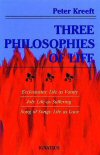
“I’ve been a philosopher for all my adult life and the three most profound books of philosophy that I have ever read are Ecclesiastes, Job, and Song of Songs.” With these opening lines, Peter Kreeft begins his exposition of the three philosophies of life and how each one is represented by one of these books of the Bible—life is vanity; life is suffering; life is love.
Kreeft shows how Dante’s great epic, The Divine Comedy, parallels these three books, from hell to purgatory to heaven. But it is also an epic played out in our hearts and lives, here and now. Just as there is movement in Dante’s epic, so there is movement in from Ecclesiastes to Job, from Job to Song of Songs. Love is the final answer to the quest of Ecclesiastes, the alternative to vanity, and the true meaning of life. Kreeft sees in these books the epitome of the theological virtues of faith, hope and love—“an essential summary of the spiritual history of the world.”
Product Details
- Title: Peter Kreeft Theology Collection
- Author: Peter Kreeft
- Publisher: Ignatius
- Volumes: 10
- Pages: 2,224
About the Author
Peter Kreeft is a renowned philosopher, theologian, and apologist. His concise, lucid, wit-infused prose draws frequent comparisons to that of C. S. Lewis. He has written dozens of books on understanding philosophy, defending the Christian faith, and encouraging Catholics on difficult doctrine. He is currently professor of philosophy at Boston College.
Interested in more from Peter Kreeft? Get three collections at a discounted price with the Peter Kreeft Bundle.
Key Features
- Tested analysis of Christianity’s toughest issues
- Valuable insights for Catholics and Protestants alike
- 10 volumes from Catholicism’s C. S. Lewis
Product Details
- Title: Peter Kreeft Theology Collection
- Author: Peter Kreeft
- Publisher: Ignatius
- Volumes: 10
- Pages: 2,224
About the Author
Peter Kreeft is a renowned philosopher, theologian, and apologist. His concise, lucid, wit-infused prose draws frequent comparisons to that of C. S. Lewis. He has written dozens of books on understanding philosophy, defending the Christian faith, and encouraging Catholics on difficult doctrine. He is currently professor of philosophy at Boston College.